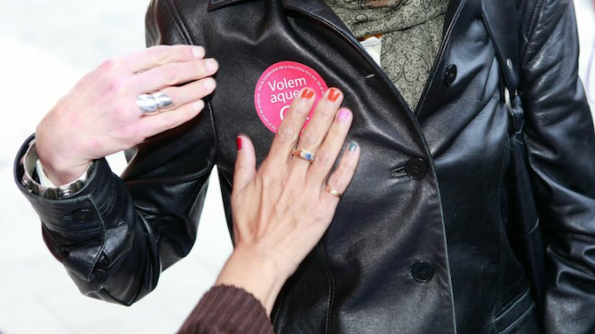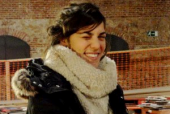Search
To search for an exact match, type the word or phrase you want in quotation marks.
A*DESK has been offering since 2002 contents about criticism and contemporary art. A*DESK has become consolidated thanks to all those who have believed in the project, all those who have followed us, debating, participating and collaborating. Many people have collaborated with A*DESK, and continue to do so. Their efforts, knowledge and belief in the project are what make it grow internationally. At A*DESK we have also generated work for over one hundred professionals in culture, from small collaborations with reviews and classes, to more prolonged and intense collaborations.
At A*DESK we believe in the need for free and universal access to culture and knowledge. We want to carry on being independent, remaining open to more ideas and opinions. If you believe in A*DESK, we need your backing to be able to continue. You can now participate in the project by supporting it. You can choose how much you want to contribute to the project.
You can decide how much you want to bring to the project.

Despite fleeing headlong forward, well not quite, in any direction that we do in an apparently disorganised or impulsive manner, there are certain areas of life in society where one can’t just let things go by without saying anything.
Last 30 May a communication from the councillor for culture of the Tarragona’s city council, Carme Crespo, finally announced what some had heard and all had resisted believing possible. The council’s proposal for the Centro de Arte in Tarragona (CA) bypassed all bridges of dialogue or exchange offered by the management and the sector to head in an alternative direction that is nothing if not surprising.
We can share the fragility of the situation that has led to the withdrawal of economic –and political- support that the Generalitat of Catalonia gave to the “Xarxa pública de centres i espais d’arts visuals de Catalunya” (public network of centres and spaces for visual arts in Catalonia), comprehended by many as being an interesting guarantee of territorial counterbalance in the diffusion and pedagogy of contemporary art practices. The budgetary disregard of the cultural and symbolic values of this network has led some centres to situations that are at times dramatic: Bòlit-Centre d’Art Contemporani in Girona has passed to the technical management of the city council itself; ACVic. Centre d’Arts Contemporànies (a model of participatory management); Centre d’Art La Panera in Lleida (the only example with evident municipal support); Can Xalant-Centre de Creació i Pensament Contemporani in Mataró (change of technical direction); Centre d’Art de Tarragona (recently announced a change of management); Centre d’Art de les Terres de l’Ebre – Lo Pati (active); Tecla Sala-Art Centre in Hospitalet (active), and Canòdrom-Centre d’Art Contemporani in Barcelona (in stand-by).
An open letter written to the Mayor of the city signed by various local, national and state entities, established four basic requisites, given the whiff of uncertainty that had been hanging over the CA for months. In it a call was made; to insure the continuity of the CA Project, that the driving Committee had battled for since 2003; that the city council safeguard the centre’s continuity as part of the Network of Art Centres in Catalonia; to respect the project of the centre as presented in the Documento 0, of January 2008, elaborated by the driving Committee of the CA; and finally, to guarantee that any possible changes in the management model would be carried out following established codes of good practice (that is to say a public open call for the direction of the centre in the event of the current contract not being renewed).
In response to these requisites, that could easily be considered representative, Crespo’s communication, on behalf of the institution, bordered on insulting. In it, the person in charge of culture indicated that faced with the need for a change in management, “the City Council will commission the “Foundation Fórum for Photography” to make a proposal for the continuity of the Art Centre”, or in other words: the assignation without a public open call of a Project that has nothing to do with the Management Plan nor with the line of the CA, toppling more than ten years of work directed at establishing quality contemporary art facilities within the territory.
For the time being there has been no official response to this proposal from the Foundation (its director, Chantal Grande, was a founding member of CONCA and participated in the tribunal selecting the project to set up the CA) confirmed that the proposal had been received and that it is in the process of being assessed by its board of trustees.
For what reason has the City Council failed to carry out even one single session assessing the activities of the CA with the current team? Why all these evasions to accept any dialogue or meetings, with the current management as much as with the sector itself? Why the lack of respect for a project that stems so far back (ten years) and has been acknowledged by the sector, as well as being in accord with the cultural policies of the PSC (the mayor’s party)?
The perplexity we are left with is tremendous, and not just from an artistic point of view, but also politically. And if this deficiency can be extrapolated on many levels in this country, it’s maybe the proximity of the affront that makes it just that bit more cutre (squalid).

Marina spent the first two years of her life without saying anything: they told her parents that she was internalizing. And even though it’s a while now since she learnt to talk, she still needs to internalize. To then shake things up, question, order, disorder and celebrate. She finds politics in many places and has a special interest in all that’s subaltern, in the “commons”, and in the points where all this has an impact on creative expression.
"A desk is a dangerous place from which to watch the world" (John Le Carré)